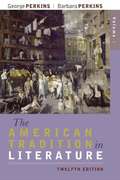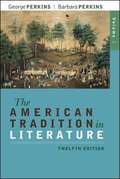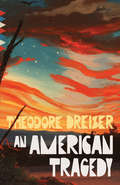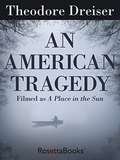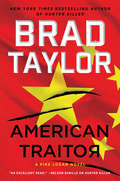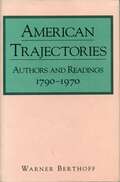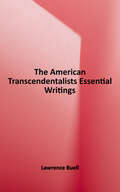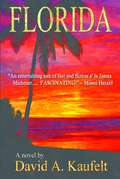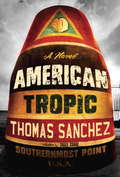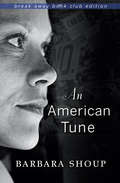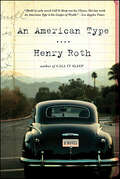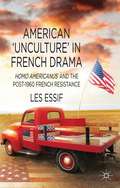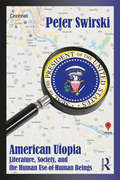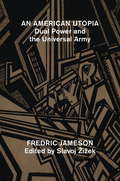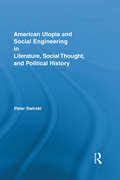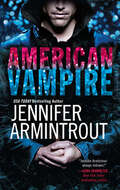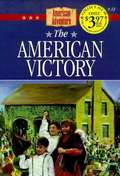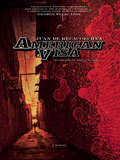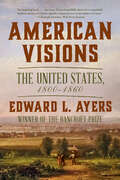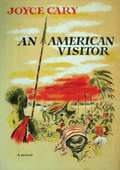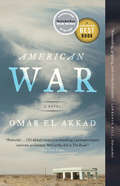- Table View
- List View
The American Tradition in Literature: Volume 2 (12th Edition)
by George Perkins Barbara Perkins James Phelan Elizabeth RenkerIn this twelfth edition, The American Tradition in Literature extends fifty years of leadership into a second half-century.
The American Tradition in Literature, Volume 1 (12th Edition)
by George Perkins Barbara PerkinsWidely known as the anthology that best unites tradition with innovation, The American Tradition in Literature is proud to enter its fifth decade of leadership among textbook anthologies of American literature. Each volume continues to offer a flexible organization, with literary merit as the guiding principle of selection. The new photos and illustrations illuminate the texts and literary/historical timelines help students put works in context.
An American Tragedy (Vintage Classics)
by Theodore DreiserThis landmark 1925 novel about a social climber who murders his pregnant lover is both a riveting crime story and a devastating commentary on the American dream. A VINTAGE CLASSIC.Theodore Dreiser was inspired by a true story to write this novel about an ambitious, socially insecure young man who finds himself caught between two very different women--and two very different visions of what his life could be. Clyde Griffiths was born poor and is poorly educated, but his prospects begin to improve when he is offered a job by a wealthy uncle who owns a shirt factory. Soon he achieves a managerial position, and despite being warned to stay away from the women he manages, he becomes involved with Roberta, a poor factory worker who falls in love with him. At the same time, he catches the eye of Sondra, the glamorous socialite daughter of another factory owner, and begins neglecting his lover to court her. When Roberta confronts Clyde with her pregnancy, Clyde's hopes of marrying Sondra are threatened, and he conceives a desperate plan to preserve his dream.
An American Tragedy (Signet Classics Ser.)
by Theodore DreiserThis epic of class, ambition, and murder in the early twentieth century is &“[a] masterpiece…America&’s Crime and Punishment&” (Kirkus Reviews). Theodore Dreiser&’s An American Tragedy is the story of a weak-willed young man who is both a villain and a victim of the valueless, materialistic society around him. Inspired by the true story of an early twentieth-century murder and adapted into a classic film under the title A Place in the Sun, An American Tragedy follows Clyde Griffiths as he is drawn into a circle of wealthy friends despite his own poverty-stricken background. Leaving the needs of his family behind as he buys expensive presents to impress a rich girl, Clyde finds that his new life leads him into a tragedy born of recklessness. Yet he continues to yearn ambitiously for money and status—a desire that will be his downfall. &“Dreiser is widely regarded as the strongest of the novelists who have written about America as a business civilization. No one else confronted so directly the sheer intractability of American social life and institutions.&”—The New Yorker
American Traitor: A Pike Logan Novel (Pike Logan #15)
by Brad Taylor“Few authors write about espionage, terrorism, and clandestine hit squads as well as Taylor does.”—Houston Press Pike Logan is on the desperate hunt for a man who is about to betray his country—and ignite a horrific new world war—in this pulse-pounding thriller from New York Times bestselling author and former special forces officer Brad Taylor Pike Logan and Jennifer Cahill are enjoying a sunny vacation down under when they get disturbing news: their friend and colleague Clifford Delmonty is in serious trouble. While working as a contractor at an Australian F-35 facility, the former Taskforce member—callsign Dunkin—saw something he shouldn’t have, and now he’s on the run from Chinese agents. Pike and Jennifer soon discover that Dunkin’s attackers are a dangerous link to a much larger scheme that could launch a full-on conflict between China and Taiwan. In its quest for dominance, China is determined to reclaim Taiwan—a pivotal ally the United States has sworn to protect. Pike learns that the Chinese have a devious plan to bait the island nation into all-out war by destabilizing the government and manipulating an artificial intelligence defense system. As the threat reaches a boiling point, Pike alone realizes that what they’re seeing isn’t actually real. A soldier who has always been trained to fight and win, Pike must now track down and neutralize the missing man who holds the key. With the help of Jennifer, the Taskforce team, and a brave Taiwanese intelligence agent, he races to prevent a catastrophic conflict from consuming a whole region of the world. <P><P><b>A New York Times Bestseller</b>
American Trajectories: Authors and Readings, 1790–1970 (G - Reference, Information and Interdisciplinary Subjects)
by Warner BerthoffIn American Trajectories Warner Berthoff argues that even in the broadest cultural and historical perspective, imaginative literature (like all the arts) is a matter of individual signatures and differences. He also puts forth that there are recognizable patterns and continuities marking off what is distinctively American, what both reflects and speaks for a shared national experience. Discussions of Emily Dickinson and Mark Twain, Scott Fitzgerald and Ernest Hemingway, Kate Chopin, Theodore Dreiser, and Edmund Wilson focus on the provenance and central character of writing by mainstream figures in our literary past. The essays on Brockden Brown, Nathan Asch, O. Henry, Frank O'Hara, Lewis Mumford, and Van Wyck Brooks highlight marginal, neglected, forgotten, or not yet fully acknowledged contributors to American writing.
American Trajectories: Authors and Readings, 1790–1970
by Warner BerthoffIn American Trajectories Warner Berthoff argues that even in the broadest cultural and historical perspective, imaginative literature (like all the arts) is a matter of individual signatures and differences. He also puts forth that there are recognizable patterns and continuities marking off what is distinctively American, what both reflects and speaks for a shared national experience. Discussions of Emily Dickinson and Mark Twain, Scott Fitzgerald and Ernest Hemingway, Kate Chopin, Theodore Dreiser, and Edmund Wilson focus on the provenance and central character of writing by mainstream figures in our literary past. The essays on Brockden Brown, Nathan Asch, O. Henry, Frank O'Hara, Lewis Mumford, and Van Wyck Brooks highlight marginal, neglected, forgotten, or not yet fully acknowledged contributors to American writing.
American Transcendentalists: Their Prose and Poetry
by Perry MillerA compilation of American transcendental poetry and prose--Emerson, Thoreau, and others.
The American Transcendentalists: Essential Writings
by Lawrence BuellTranscendentalism was the first major intellectual movement in U.S. history, championing the inherent divinity of each individual, as well as the value of collective social action. In the mid-nineteenth century, the movement took off, changing how Americans thought about religion, literature, the natural world, class distinctions, the role of women, and the existence of slavery. Edited by the eminent scholar Lawrence Buell, this comprehensive anthology contains the essential writings of Ralph Waldo Emerson, Henry David Thoreau, Margaret Fuller, and their fellow visionaries. There are also reflections on the movement by Charles Dickens, Henry James, Walt Whitman, Louisa May Alcott, and Nathaniel Hawthorne. This remarkable volume introduces the radical innovations of a brilliant group of thinkers whose impact on religious thought, social reform, philosophy, and literature continues to reverberate in the twenty-first century.
American Tropic
by David A. KaufeltIn the tradition of John Jakes and James Michener comes David Kaufelt's sweeping saga of Florida--and the men and women who forged their extraordinary destinies upon it. Grand entertainment.
American Tropic (Vintage Contemporaries)
by Thomas SanchezThomas Sanchez's American Tropic is a heart-racing ecological thriller that showcases today's headline issues. Sanchez's first Key West novel, Mile Zero, was hailed by The Washington Post Book World as a "holy terror of a book of immense power and passion," acclaimed by The New York Times Book Review as "dazzling," and lauded by Vanity Fair as "mythmaking and magisterial." Now, Sanchez returns again to America's famous southernmost continental point, Key West.This exotic island city in the Florida Keys is being terrorized by horrific murders committed by a mysterious voodoo assassin. With each new kill, it becomes clear that the skeleton-clad executioner has an ecological agenda. The novel propels us through a complex maze populated by rapacious developers, ruthless scammers, and common folk engaged in heroic acts to save their community.The characters, from the defenders of America's only continental reef to the destroyers of marine life, are all swept up in this torrent of horrors. Everyone dreads being the killer's next victim as the clock counts down to the end of hurricane season and the final dramatic explosion of fear and rage. With canny perception and striking revelations, American Tropic illuminates a world of dark desires, hidden truths, and colliding destinies.From the Hardcover edition.
An American Tune: A Novel (Break Away Book Club Edition)
by Barbara ShoupA woman&’s former life as a radical antiwar protestor threatens her new identity as a wife and mother in this &“poignant and stirring novel&” (Booklist).While reluctantly accompanying her husband and daughter to freshman orientation at Indiana University, Nora Quillen hears someone call her name—her real name—a name she has not heard in more than twentyfive years. Not even her husband knows that back in the &‘60s she was Jane Barth, a student deeply involved in the antiwar movement. Now Jane, and her radical past, are about to come into the light. Shuttling between the present day and the turbulent 1960s, An American Tune tells the story of Jane, a girl from a working-class family who flees when she becomes complicit in a deadly bombing, and Nora, the woman she becomes: a wife and mother living a quiet life in northern Michigan. An American Tune is both a poignant story of a family crushed under the weight of suppressed truths, and an evocation of a country struggling with its own violent legacy.
An American Type: A Novel
by Henry Roth“His early novel Call It Sleep was his Ulysses. His late work An American Type is his Grapes of Wrath.”—Thane Rosenbaum, Los Angeles Times This “glorious, evocative, literary novel for the ages” (Los Angeles Times) has finally taken its place within the great canon of American fiction. Set during the Great Depression, against a backdrop of New York’s glimmering skyscrapers and Los Angeles’s seedy motor courts, this autobiographical work concludes the unparalleled saga of Henry Roth, whose classic Call It Sleep, published in 1934, went on to become one of Time’s 100 best American novels of the twentieth century. With echoes of Nathanael West and John Steinbeck, An American Type is a heartrending statement about American identity and the universal transcendence of love.
American ‘Unculture’ in French Drama
by Les EssifA book about the role America plays in the French imagination, as it translates to the French stage. Informed by a rich variety of Western cultural scholarship, Essif examines two dozen post-1960 works representing some of the most innovative dramaturgy of the last half century, including works by Gatti, Obaldia, Cixous, Koltes, and Vinaver.
American Utopia: Literature, Society, and the Human Use of Human Beings
by Peter SwirskiFrom Black Tuesday to the White House, from Plato to Robert Nozick, from Eugene Debs to Richard Nixon, from Peter Cornelis Plockhoy to the hippie communes of the Sixties, from universal basic income to utopian basic income, from proverbial wisdom to multilevel selection, from Big Data to paleomorality, from Prisoner’s Dilemma to social-engineering Israeli kindergartens, from time travel to gene engineering, from the pretzel logic of meritocracy to deaggressing humanity, American Utopia maps the pitfalls and windfalls of social reform in the name of the human use of human beings. Interrogating the assumptions behind four outré utopias by Thomas M. Disch, Bernard Malamud, Kurt Vonnegut, and Margaret Atwood, the book interrogates the assumptions that have historically been central to the utopian project. Whence the seeds of social discontent? Whence our taste for egoism and altruism? For waging war and waging peace? Can we bioengineer human nature to specifications? Should we? Who makes better guardians: humans or machines? And who will guard the guardians?
An American Utopia: Dual Power and the Universal Army
by Slavoj Zizek Fredric JamesonControversial manifesto by acclaimed cultural theorist debated by leading writers Fredric Jameson's pathbreaking essay "An American Utopia" radically questions standard leftist notions of what constitutes an emancipated society. Advocated here are--among other things--universal conscription, the full acknowledgment of envy and resentment as a fundamental challenge to any communist society, and the acceptance that the division between work and leisure cannot be overcome. To create a new world, we must first change the way we envision the world. Jameson's text is ideally placed to trigger a debate on the alternatives to global capitalism. In addition to Jameson's essay, the volume includes responses from philosophers and political and cultural analysts, as well as an epilogue from Jameson himself. Many will be appalled at what they will encounter in these pages--there will be blood! But perhaps one has to spill such (ideological) blood to give the Left a chance. Contributing are Kim Stanley Robinson, Jodi Dean, Saroj Giri, Agon Hamza, Kojin Karatani, Frank Ruda, Alberto Toscano, Kathi Weeks, and Slavoj i ek.From the Trade Paperback edition.
American Utopia and Social Engineering in Literature, Social Thought, and Political History (Routledge Transnational Perspectives on American Literature)
by Peter SwirskiThe United States today is afflicted with political alienation, militarized violence, institutionalized poverty, and social agony. Worst of all, perhaps, it is afflicted with chronic and acute ahistoricism. America insist on ignoring the context of its present dilemmas. It insists on forgetting what preceded the headlines of today and on denying continuity with history. It insists, in short, on its exceptionalism. American Utopia and Social Engineering sets out to correct this amnesia. It misses no opportunity to flesh out both the historical premises and the political promises behind the social policies and political events of the period. These interdisciplinary concerns provide, in turn, the framework for the analyses of works of American literature that mirror their times and mores. Novels considered include: B.F. Skinner and Walden Two (1948), easily the most scandalous utopia of the century, if not of all times; Ken Kesey’s One Flew Over the Cuckoo’s Nest (1962), an anatomy of political disfranchisement American-style; Bernard Malamud’s God’s Grace (1982), a neo-Darwinian beast fable about morality in the thermonuclear age; Walker Percy’s The Thanatos Syndrome (1986), a diagnostic novel about engineering violence out of America’s streets and minds; and Philip Roth’s The Plot Against America (2004), an alternative history of homegrown ‘soft’ fascism. With the help of the five novels and the social models outlined therein, Peter Swirski interrogates key aspects of sociobiology and behavioural psychology, voting and referenda procedures, morality and altruism, multilevel selection and proverbial wisdom, violence and chip-implant technology, and the adaptive role of emotions in our private and public lives.
American Vampire
by Jennifer ArmintroutBuried in the Heartland is a town that no one enters or leaves. Graf McDonald somehow becomes its first visitor in more than five years...and he was only looking for a good party. Unfortunately, Penance, Ohio, is not that place. And after having been isolated for so long, they do not like strangers at all.Jessa's the only one to even remotely trust him, and she's desperate for the kind of protection that only a vampire like Graf can provide. Supplies are low, the locals are ornery for a sacrifice and there's a monster more powerful than Graf lurking in the woods. New men are hard tocome by in this lonesome town, and this handsome stranger might be Jessa's only hope for salvation.Even if she has to die first...
American Vandal
by Roy MorrisUnintimidated by Old World sophistication or travel to undeveloped parts of the globe, Mark Twain spent a surprising amount of time outside the continental United States. Roy Morris, Jr. focuses on the dozen years he lived overseas and the books he wrote encouraging middle-class Americans to follow him around the world, at the dawn of mass tourism.
The American Victory (Barbour Book's The American Adventure, Book #12)
by Joann A. GrotePaul Lankford's father is a stranger to him. Off fighting the Revolutionary War, Paul's father has rarely been home during the past six years. Now that is changing. The fighting is over, America has won, and Paul's father is home. Paul knows he should love his father, but how can he love a person he doesn't even know? He's much more comfortable discussing ships with his Uncle Ethan or playing with his cousin Maggie than he is listening to his own father go on about politics. Paul has tried everything he can think of to make the relationship right, but nothing seems to work. Will America's victory lead to Paul's defeat?
American Visa: A Novel
by Adrian Althoff Juan De Recacoechea"American Visa is beautifully written, atmospheric, and stylish in the manner of Chandler . . . a smart, exotic crime fiction offering."--George Pelecanos, author of The Night Gardener"American Visa is a stunning literary achievement. It is insightful and poignant, a book every thoughtful American should read, and once read, read again."--William Heffernan, Edgar Award-winning author of The Corsican"In his search for an American visa, the high school teacher in this novel embodies the dreams and aspirations of many would-be immigrants south of the border. This is a thriller with a social conscience, a contemporary noir with lots of humor and flair. The streets of La Paz have never looked so alive. This is one of the best Latin American novels of the last fifteen years." --Edmundo Paz-Soldan, author of Turing's Delirium"Mario Alvarez is tremendous, an everyman desperate to escape Bolivia's despair who can't elude his own tricks of self-sabotage. At a time when the debate around U.S. immigration reduces many people around the world to caricatures, this singular and provocative portrait of the issue will connect with readers of all political stripes." --Arthur Nersesian, author of Suicide CasanovaArmed with fake papers, a handful of gold nuggets, and a snazzy custom-made suit, an unemployed schoolteacher with a singular passion for detective fiction sets out from small-town Bolivia on a desperate quest for an American visa, his best hope for escaping his painful past and reuniting with his grown son in Miami.Mario Alvarez's dream of emigration takes a tragicomic twist on the rough streets of La Paz, Bolivia's seat of government. Alvarez embarks on a series of Kafkaesque adventures, crossing paths with a colorful cast of hustlers, social outcasts, and crooked politicians--and initiating a romance with a straight-shooting prostitute named Blanca. Spurred on by his detective fantasies and his own tribulations, he hatches a plan to rob a wealthy gold dealer, a decision that draws him into a web of high-society corruption but also brings him closer than ever to obtaining his ticket to paradise. Juan de Recacoechea was born in La Paz, Bolivia, and worked as a journalist in Europe for almost twenty years. After returning to his native country, he helped found Bolivia's first state-run television network, served as its general manager, and dedicated himself to fiction writing. Recacoechea is the author of seven novels. American Visa is his first novel to be translated into English.
American Visions: The United States, 1800-1860
by Edward L. Ayers“An inspiring book.… American Visions beautifully shows how remarkably resilient dreams of a better republic remained even in the darkest of times.” —Christoph Irmscher, Wall Street Journal A revealing history of the formative period when voices of dissent and innovation defied power and created visions of America still resonant today. With so many of our histories falling into dour critique or blatant celebration, here is a welcome departure: a book that offers hope as well as honesty about the American past. The early decades of the nineteenth century saw the expansion of slavery, Native dispossession, and wars with Canada and Mexico. Mass immigration and powerful religious movements sent tremors through American society. But even as the powerful defended the status quo, others defied it: voices from the margins moved the center; eccentric visions altered the accepted wisdom, and acts of empathy questioned self-interest. Edward L. Ayers’s rich history examines the visions that moved Frederick Douglass, Margaret Fuller, the Native American activist William Apess, and others to challenge entrenched practices and beliefs. So, Lydia Maria Child condemned the racism of her fellow northerners at great personal cost. Melville and Thoreau, Joseph Smith and Samuel Morse all charted new paths for America in the realms of art, nature, belief, and technology. It was Henry David Thoreau who, speaking of John Brown, challenged a hostile crowd "Is it not possible that an individual may be right and a government wrong?" Through decades of award-winning scholarship on the Civil War, Edward L. Ayers has himself ventured beyond the interpretative status quo to recover the range of possibilities embedded in the past as it was lived. Here he turns that distinctive historical sensibility to a period when bold visionaries and critics built vigorous traditions of dissent and innovation into the foundation of the nation. Those traditions remain alive for us today.
An American Visitor
by Joyce CaryAn American visitor and uninvited guest in the village of Nok, Marie Hasluck is an irrepressible anthropologist who believes that she has found the Kingdom of Heaven in the forests of Nigeria. There, to her eyes, the Birri tribesmen make love and war unfettered by the constraints and complications of Western civilisation; a state which Marie finds enviable and which she does her best to emulate.However, all is not well even in this pagan paradise: white prospectors are staking claims within Birri territory and the eccentric District Officer, Bewser, can no longer keep them at bay, for all his promises to the villagers. As the Birri warriors become increasingly enraged by the colonialists' betrayal and as her own involvement with Bewser deepens, Marie finds that her position as a charmed but distanced onlooker is inevitably compromised.
American Voices: Literature
by Perfection LearningProvide your students a diverse set of texts, both classic and contemporary to probe relevant themes, develop literary analysis skills, and generate lively discussions. <p><p> The American Voices anthology supports common eleventh grade literature requirements and engages students using a literary lens for every selection. The Interactive Edition provides power digital tools to ensure text comprehension, build close reading skills, and increase collaboration.
American War: A Novel
by Omar El AkkadAn audacious and powerful debut novel: a second American Civil War, a devastating plague, and one family caught deep in the middle -- a story that asks what might happen if America were to turn its most devastating policies and deadly weapons upon itself.Sarat Chestnut, born in Louisiana, is only six when the Second American Civil War breaks out in 2074. But even she knows that oil is outlawed, that Louisiana is half underwater, that unmanned drones fill the sky. And when her father is killed and her family is forced into Camp Patience for displaced persons, she quickly begins to be shaped by her particular time and place until, finally, through the influence of a mysterious functionary, she is turned into a deadly instrument of war. Telling her story is her nephew, Benjamin Chestnut, born during war as one of the Miraculous Generation and now an old man confronting the dark secret of his past -- his family's role in the conflict and, in particular, that of his aunt, a woman who saved his life while destroying untold others.
